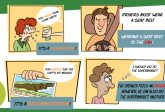Ten Things You Need to Know About Modal Verbs

Hi grammar lovers! Welcome to this blog post which takes an in depth look at modal verbs.
Modal verbs are a really important part of the English language. They help us express many things such as ability, possibility and permission.
Modal verbs are quite special and follow different patterns and rules to other verbs. Learning how to use modal verbs correctly will greatly improve your English.
In this blog post, we’ll look at what makes modal verbs different from other verbs. We’ll focus on ten things that make modal verbs special. We hope it helps you on your journey to speaking excellent English!
Ten Things You Need To Know About Modal Verbs
1. There are 10 Modal Verbs
Must May Might
Can Could
Should Shall
Will Would
Ought to
2. Modal verbs have no ‘s’ form
Modal verbs have the same form for all the persons. This means we say:
I can
You can
He/she/it can
We can
You can
They can
3. Modal verbs are always followed by an infinitive
This means we say:
I must go
You must go
He/she/it must go (Not ‘goes’!)
We must go
You must go
They must go
4. Modal verbs have no past simple or past participle forms.
I musted go
I have musted go
To use a modal verb to talk about the past we sometimes use the auxiliary verb have followed by the past participle of the main verb:
I must have gone
She could have seen
They might have walked
5. Modal verbs come before the word not to form a negative meaning:
This means we say:
I must not go
You must not go
He/she/it must not go (Not ‘goes’!)
We must not go
You must not go
They must not go
Note: We don’t use do/did with modal verbs:
I must not go (not ‘I didn’t must go)
We could not read (not ‘We didn’t could read)
She might not come (not ‘She doesn’t might come)

6. Modal verbs (except may) have a negative contraction:
must – mustn’t
might – mightn’t
can – can’t
could – couldn’t
should – shouldn’t
will – won’t (not willn’t)
would – wouldn’t
ought to – oughtn’t to
may – may not (not mayn’t)
7. Modal verbs come before the subject in ‘yes/no’ questions:
This means we say:
Can you come with us? (You can come with us?)
Should we bring something? (We should bring something?)
8. Modal verbs come before adverbs like always, usually, also, even:
This means we say:
You should always be polite.
She can even speak Chinese.
They might also live in Dublin.
9. Modal verbs come first in a verb phrase. A verb phrase is two or more words that make a verb structure.
For example:
I could not have gone.
We should start to cook.
10. Modal verbs are used in shortened sentences. These are normally responses to questions which use the same modal verb.
For example:
Question: Can anyone here speak German?
Response: I can.
Question: Could we meet at 10?
Response: No, we couldn’t.
Thank you for reading our post. You’ll find more English grammar tips elsewhere on our site and if you’d like information on our online English courses live from Dublin, please do not hesitate to contact us.





